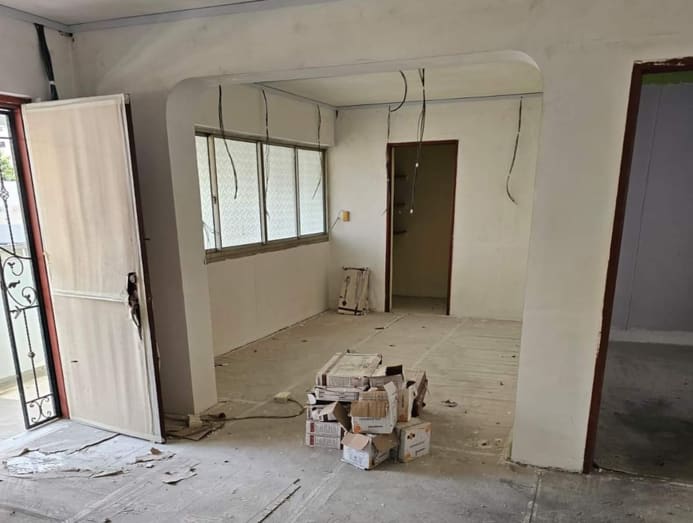‘I told my husband I was done’: The heartbreak for people who write off thousands they lost to failed or absconded contractors, vendors
Lawyers say recovering money in renovation disputes is often difficult, especially if the contractor’s company has closed or lacks assets.��

Mr Jeremiah Lim in his home on Jun 9, 2025. He is owed money by an interior design firm over incomplete renovation work. (Photo: CNA/Raj Nadarajan)

This audio is generated by an AI tool.
Ms Wong Noorina May thought the S$55,000 renovation for her resale flat was off to a promising start in 2023.����
The 42-year-old homemaker had been impressed by the makeover her cousin’s new home received, and on her husband’s suggestion, decided to hire the same interior designer, Mr Yusoff Ayub, who ran Icon Design & Build Consultants.��
“Before that, I had checked online and saw that his company was listed on Renopedia, so we felt assured,” she told CNA TODAY, referring to the online platform that links people to interior designers and contractors.
The quoted price seemed reasonable, Ms Wong said. They signed the agreement in January 2023 and paid a deposit of around S$15,000.��
In March that year, everything started smoothly with weekly updates from the interior designer – tiles were picked, hacking began, and fittings were selected.
She and her husband paid progressively for��four months and had faith that this was part and parcel of the renovation process. But as the weeks went by, red flags emerged.
“My father-in-law would go down to the flat once or twice and notice that no one was doing any work,” she said, adding that she and her husband had transferred a total of S$45,000 to the interior designer at that point, which was in accordance with the scheduled arrangement.��
“Even then, Yusoff was still replying to our messages, saying things like the hacking was done, and they were waiting for the vinyl flooring��and electricians to come.”��
After receiving the last update from him on May 2, 2023, Ms Wong said Mr Yusoff became uncontactable three days later. His office had been cleared out, and they were unable to reach him.����
Ms Wong is one of several people interviewed by CNA TODAY who shared their horror stories after��interior designers, contractors��and bridal companies��took prepayments from them��and absconded.

In 2024, renovation contractors ranked among the top five industries with the highest number of consumer complaints, according to the Consumers Association of Singapore (Case), which received 962 complaints against the sector.
While this marked a decline from 1,168 complaints in 2023 and 1,454 in 2022, the sector still saw the highest amount of prepayment losses across all industries, totalling around S$728,000 last year.
The bridal industry followed with approximately S$284,000 in losses, while mover services accounted for around S$134,000.
Within the contractors industry, notably, approximately 97 per cent of the complaints were lodged against non-CaseTrust-accredited contractors, highlighting the risks of engaging with firms that lack consumer protection safeguards.
A CaseTrust-accredited renovation contractor is a renovation firm in Singapore that has passed rigorous audits by Case and offers key protection for consumers, including safeguarding deposits in the event of a sudden business closure.
After Mr Yusoff disappeared, Ms Wong filed a police report on May 12, 2023, though she was informed a year later that "the police have decided not to take further action against the accused for the offence of breach of agreement".��
She had also filed a complaint with Case. “But they couldn’t reach him, so nothing could move forward.” Case's mediation process involves both parties – the consumer and the business – working together to resolve the matter.��
Although Ms Wong considered applying for legal aid, she said she felt worn out after months of distress, from chasing updates on the renovation to appealing for help online when their home was left unfinished.
“I was so tired. I told my husband I was done. By that point, I didn’t think this guy would have any money left to pay us back anyway. I was sure it was all gone,” she said.��
In a written parliamentary reply in 2022, then Law and Home Affairs Minister K Shanmugam stated that renovation fraud typically involves renovation contractors inducing victims to make payments for promised renovation works, which are either partially completed or not carried out at all.
In most of these cases, the contractors become uncontactable after collecting payment, or provide excuses to explain why they were unable to complete the promised works, he said.��
Mr Shanmugam also noted that while the contractor may sometimes face genuine business distress, some cases may involve fraudulent intent, but it can be "very difficult" to prove in court.
"Recovery of monies can also be difficult. The culprit may no longer have the money. Then, while he could go to jail, his customers may not get the money."
For smaller claims, homeowners can turn to the Small Claims Tribunal (SCT), which handles disputes valued at up to S$20,000.
For cases involving sums above that threshold but below S$100,000, lawyers said that these often fall into a legally grey area – too large for the SCT, yet not substantial enough to justify the high costs and time involved in pursuing a full civil suit.
In such cases, lawyers said many clients ultimately decide not to proceed, particularly when the errant company has little to no chance of satisfying a judgment.
With the renovation and bridal industries experiencing the highest prepayment losses last year, CNA TODAY spoke to those caught out by contract breaches in the renovation and bridal sectors, and how they attempted to seek justice.��
THE EMOTIONAL TOLL OF FINANCIAL LOSS
Left in limbo, Ms Wong and her family turned to Facebook to seek help for their unfinished home.��
Fortunately, several interior design and renovation companies responded to the request, with the work divided and handled by different firms.��
For example, one interior design company took charge of coordinating the overall renovation timeline. Another sponsored the paint, while a separate firm stepped in to install the flooring in the living room.
Several attempts to reach Mr Yusoff for comment for this article were unsuccessful.��When CNA TODAY visited his home, a woman who identified herself as his family member said she has not been in contact with him since 2023 and does not know his whereabouts.
In a separate case, homeowner Jeremiah Lim, a 37-year-old musician and lecturer, recalled his ordeal when trying to recover his loss.
He told CNA TODAY that he lost over S$100,000 on his resale flat renovation project, leaving him to grapple with months of frustration, financial strain, and emotional exhaustion.
In December 2022, Mr Lim and his wife decided to engage Studio Kalasan, an interior design firm, because a friend worked there.��
The couple did their due diligence, comparing quotes and eventually agreed to place their trust in Studio Kalasan by signing the contract in January 2023.��
But problems soon emerged. Mr Lim said that despite making prepayments covering everything from project confirmation to carpentry progress and appliance purchases, work barely started.��
When asked why he ended up losing such a hefty sum in prepayments to the firm, Mr Lim explained that while the contract was initially for over S$90,000, there were several additional top-ups along the way, such as the purchase of tiles and appliances for the house.��
Frustrated, Mr Lim cancelled the contract in June 2023. Although repayment plans were drawn up and signed by the firm, agreeing to reimburse him, the company allegedly defaulted on these payments.
Mr Lim said his first measure was to hire debt collectors to recover some of the money, and they managed to collect around over S$20,000.��
However, after that, the interior designers would reportedly start avoiding the debt collectors by pretending no one was home, he added. Notices were sent, but to no avail.��

The impact was more than just financial. For nearly nine months, Mr Lim and his wife had no home to call their own and were forced to rent elsewhere while battling to get their money back.��
As Mr Lim’s claim exceeds the SCT’s limit of S$20,000, he said he could not pursue that option. Instead, he lodged a complaint with Case.
“I also filed four police reports, but each time the police told me it was a civil matter, likely a failed business.��When I consulted lawyers with the same evidence I presented to the police, they said it amounted to criminal breach of trust."
“It was only after I rallied more than eight other victims, provided them with important details to include in the report, and got them to file reports within the same week that the police reopened my case.”
In response to CNA TODAY's queries, Ms Tursina Dhasharudin, former co-founder of the now-defunct Studio Kalasan, said that as of Friday (Jun 13), around S$24,000 has been repaid to Mr Lim and his wife out of the $114,000 they had initially paid to the company.
"Currently, we are undergoing personal bankruptcy proceedings, initiated by the legal team of Mr Jeremiah (Lim) to allow him to claim or liquidate any viable assets and establish a structured repayment plan through legal channels under the bankruptcy scheme with a third-party trustee," she said.��
"With that, on top of the low job opportunities, this has made it difficult to secure stable work."
Ms Tursina added that Mr Lim had also contacted some of her previous workplaces, which she said affected her ability to make quicker repayments – a situation she described as “weighing heavily” on her and her partner and one they are “actively trying to resolve so that both parties can come to a middle ground”.
"The challenges in the renovation industry are real, and we take full responsibility for the poor business decisions we made at the time."��
In some cases, homeowners told CNA TODAY that being left in the lurch also meant being saddled with debt, as they had taken out loans to pay the vendors' deposits.
One homeowner, who cannot be named as the case is pending in court, said he had to engage a second contractor to complete the renovation of his flat, bringing his total renovation cost to nearly S$200,000, including the sum he had prepaid to the original contractor who disappeared.
"I’m still in debt, still trying to pay it off. There was a dark period when I kept wondering, 'Was I really scammed?' I couldn’t make sense of it."
For couples in the midst of wedding planning, the sudden closure of vendors meant scrambling to rebook services within a much tighter timeline.
This was the case for Mr Brendan Tan, 31, an e-commerce manager, who was among many affected when bridal studio Love Nest and its related entities abruptly shut down in April 2024.
According to Case, the collapse of Love Nest and its affiliated studios contributed to the bridal industry recording the second-highest amount in prepayment losses in 2024, approximately S$284,000.
After signing with the bridal studio at a wedding show in December 2023, Mr Tan had paid around S$4,000 as a deposit for services including a pre-wedding photoshoot and gown rentals, with additional payments due closer to the wedding date in September 2024.��
Then came the text to Mr Tan in April 2024, seen by CNA TODAY, saying that the company “will be temporarily closing its operations from April 2, 2024, until further notice” due to “unforeseen circumstances and financial challenges”.��
"We had to go back to the drawing board in terms of finding vendors. It was quite tiring because we thought everything was settled."
Mr Tan said he and his partner also had to be extra careful the second time around, especially as they were still unsure if they would recover their money. “We had to dip into other finances just to get things moving,” he said.
GETTING THE MONEY BACK
While filing a claim with the SCT was not a viable option for Ms Wong and Mr Lim, some homeowners in renovation disputes – in which the vendor remained contactable – were able to seek redress successfully.��
One such case was that of Ms Shasha Malik, a 34-year-old entrepreneur, who had paid a deposit of S$20,680 to her friend’s interior designer firm in January 2023.��
However, due to friction between both parties during the renovation process, Ms Shasha said the interior designer later refused to continue the agreed-upon works.

After repeated disagreements with her interior designer, Ms Shasha wanted to cancel the renovation��contract in February 2023 and get a refund for the work that was not completed, which she estimated to be approximately S$14,000 after checking against the company's quotation.��
However, the firm only offered S$2,800 in compensation.��Ms Shasha and her husband were told that if they wanted the full amount they were seeking, they would need to engage a lawyer. Not wanting to go through the hassle and cost of legal action, they felt they had no choice but to proceed with the firm.
"At the time, my husband and I were unaware of the SCT and believed legal action would be costly. We were also hoping to move in before Hari Raya, which was in line with the renovation timeline," she said.��
Unfortunately, further setbacks soon followed, including manpower delays, absences due to COVID-19 that were not communicated to her, as well as poor workmanship.
Frustrated by the breach of contract and lack of progress, she publicly shared her experience on social media to raise awareness.��She did��not identify the firm at the time.��
Ms Shasha also sought legal advice, preparing evidence and other case files that she and her husband had, to ensure there was proof for every claim and damage.��
After weighing her options, Ms Shasha took her case to the SCT, which eventually ruled in her favour. The interior designer was ordered to compensate her approximately S$6,000 for incomplete works covered by the downpayment, as well as additional damages.
She advised homeowners in similar situations to refer back to their original quotation, list all incomplete works and take clear photos as evidence. Any damages should also be documented thoroughly, Ms Shasha noted.��
“I had evidence that it was a breach of contract, and being able to prove this was a key point that helped us with our SCT case,” she said.��
For some victims left in the lurch after their engaged vendor became uncontactable, filing a credit card dispute with their bank proved to be an effective form of restitution.��
Mr Tan, who was affected by the abrupt closure of bridal studio Love Nest and its affiliated entities in April 2024, said that after receiving the notice, he and other affected couples formed a Telegram chat group and explored various ways to recover their deposits – including filing complaints with Case and lodging police reports.
“Some victims started recovering their deposits through their credit card companies. That’s what we did. Our bank asked us for proof of no response, such as our WhatsApp logs and calls, invoice numbers, payment records, and UEN (unique entity number).”��
Mr Tan said the bank took about a month to investigate, and he received his deposit back via credit card chargeback.��
“Some couples went to SCT and got a writ, but enforcing that writ meant hiring a debt collector to recover goods or money.��
“It’s not easy. You’d have to seize assets like gowns and sell them. That’s not practical for us when there were so many couples involved.”��
Police investigation for the case is still ongoing.
WHY SOME CASES DON'T END UP IN COURT
Lawyer Chooi Jing Yen said that while such cases of contractors who default after prepayments are made are relatively common, most��do not end up��before a judge or a tribunal magistrate.
“A lot of people don’t decide to��start legal proceedings��because sometimes, even after spending all the legal costs and getting a judgment, they still can’t collect the money,” he said. ��
“The company might decide to wind up or simply have no assets due to poor management. This is a risk that people should consider before initiating legal action because if you can’t sue to get your money back, it becomes very difficult.”��
Some victims may be confused as to why the police classify such cases as civil rather than criminal. To this, Mr Chooi, who is director of law firm Chooi Jing Yen LLC, said the classification often depends on specific legal thresholds.
For instance, if the company genuinely intended to carry out the work at the start but encountered problems midway, it typically would not amount to a criminal offence, as there was no initial intent to deceive, he said.��
“It only becomes criminal if it can be shown that there was no intention to complete the job from the outset. But proving that intent can be difficult.”��
Mr Abdul Rahman Mohd Hanipah, lawyer and managing director of law firm ARLC, said renovation disputes are usually treated as civil matters, especially if they appear to be isolated cases.
“If it seems like a one-off situation where a contractor failed to deliver on a job, it’s typically treated as a civil matter, and the appropriate course of action would be to file a civil claim to recover your money.”
However, Mr Abdul Rahman said that if there is a pattern of conduct – for example, multiple clients reporting similar experiences – then it could potentially fall under Section 420 of the Penal Code,��which covers cheating and dishonestly inducing someone to deliver property. The offence carries a jail term of up to 10 years, a fine, and caning.
"There may also be elements of criminal breach of trust if a contractor was entrusted with funds meant specifically for renovation works but used the money for other purposes."
In criminal cases like cheating, Ms Christine Low, director of law firm Peter Low Chambers, said restitution – the act of returning or compensating for losses caused by the offender’s actions – is possible but not a legal right that victims can demand as part of sentencing.
"However, it can play an important mitigating role, as offenders who voluntarily compensate victims may receive lighter sentences.
"The court’s focus in criminal cases is on punishment and deterrence, not compensation, so victims usually need to pursue civil lawsuits to obtain full restitution."
While such a law protects consumers from cheating, Mr Shanmugam, in a parliamentary reply in 2024, said that the authorities observed that many cases of non-fulfilment of contracts were not the result of fraud, but business distress.
"The right course is in civil remedies, which have been made easier to access over the years. For example, in 2019, the government raised the ceiling for claims that can be brought in the Small Claims Tribunal to S$20,000 – or S$30,000 if all parties consent."��
Ms Low said that when a case exceeds the limit,��homeowners may pursue claims in the magistrate’s or district court, depending on the sum. This requires filing a civil suit, typically with legal representation, she added.
"In such cases, thorough documentation, such as written agreements, payment records, and photographs of works done or abandoned, is key."��
However, Ms Low also said that civil litigation costs vary depending on complexity, amount claimed, and whether the matter goes to trial. Legal fees for claims between S$50,000 and S$150,000 can range from several thousand to tens of thousands of dollars, she added.��
"If uncontested or resolved via settlement, costs are lower. It may be worth pursuing when the contractor has assets, the evidence is strong, and the amount lost justifies the expense.
"However, if the defendant is unable to pay the debt or does not have enough income or assets, or the facts are heavily disputed, recovery may be uncertain despite a favourable judgment," she said, adding that a lawyer can provide a preliminary cost-benefit analysis to help clients decide.
WHAT CUSTOMERS CAN DO
In response to CNA TODAY's queries, Case president Melvin Yong urges all consumers to patronise CaseTrust-accredited renovation companies, as the hefty prepayment losses suffered by consumers in this sector have been “entirely attributed” to non-CaseTrust-accredited companies.��
He said these accredited renovation companies commit to adhering to Case’s consumer-friendly policies, such as progressive payments under the Case Standard Renovation Contracts, deposit protection, and mandatory mediation should any disputes arise.
“Setting up a renovation company in Singapore does not require a licence, and the ease of creating and winding down such companies poses a challenge in helping consumers to recover their monies from non-CaseTrust-accredited renovation companies,” said Mr Yong.��
��
“Consumers can be assured that CaseTrust-accredited companies insure any deposits paid and are committed to resolving disputes promptly.”
Mr Yong, who is also MP for Radin Mas Single Member Constituency,��also said that Case has urged the Housing and Development Board (HDB) to make CaseTrust accreditation the minimum requirement to be listed in the HDB directory of renovation contractors.
“Doing so will ensure that the bulk of homeowners, who are HDB owners, will be protected when renovating their homes.”
Consumers can also refer to the Singapore Interior Design Accreditation Scheme (SIDAS), which serves as a benchmark for excellence in the industry, said a SIDAS spokesperson.��
The scheme aims to boost consumer confidence by accrediting interior designers who meet stringent standards in education, experience and professional ethics.
In cases of disputes, such as incomplete work or unsatisfactory design outcomes, the spokesperson said clients who engage SIDAS-accredited designers have access to an additional layer of accountability, including a formal grievance process to review and address complaints.
"To support more informed decision-making ... we will also be launching public education campaigns in Q3 and Q4 of 2025 to raise awareness of the role and responsibilities of interior designers, empowering consumers to make confident choices."
Mr Chooi of Chooi Jing Yen LLC said one important step for customers is to conduct a background��check on the entity they are��dealing with, because sometimes, a company might be registered under one name, but the invoice comes from another.��
“Look up the company's profile on Acra (Accounting and Corporate Regulatory Authority) for who the directors and shareholders are, see if there’s a good mix of individuals involved,” he said.��
“If it’s a sole director setup, it may not be as robust as a company with a more diversified structure. Ideally, you don’t want to place full trust in a one-man show that was just set up last month.”��
Asked if there is anything a homeowner can include in the quotation or contract – such as a clause to offer protection if the project goes awry or the interior designer disappears – Mr Chooi said that ultimately, if the company is unlikely to honour the contract, the homeowner may still have to pursue a claim in court.
"Honestly, these things often go south not because of the contract, but because of how the business is run," he said.��
"In such cases, it makes little difference what additional terms are negotiated. The same concerns about legal costs and the difficulty of recovering a judgment debt still apply."
And if a dispute or possible breach of contract arises, ARLC's Mr Abdul Rahman said homeowners should, at the bare minimum, seek to preserve evidence first.
“Get a quantity surveyor to assess what work has been done and what hasn’t, and how much you may have been shortchanged. You need documentation before considering your next steps.”
He added that in many renovation disputes, instead of immediately spending money on legal fees, it may be more practical to find solutions to complete the��home renovation first.
“Yes, you can sue. You might even win. But whether you can actually recover the money, that’s case by case. There’s no guarantee.”��
Ultimately, Mr Abdul Rahman said consumers must take ownership of their decisions and make informed choices before engaging a company.��
“When you’re buying your first house, you’re in a happy, excited state. You’re not thinking negatively.��
“But don’t just go with someone your family recommends or someone who makes you feel good. Do your research. Shortlist properly.”









